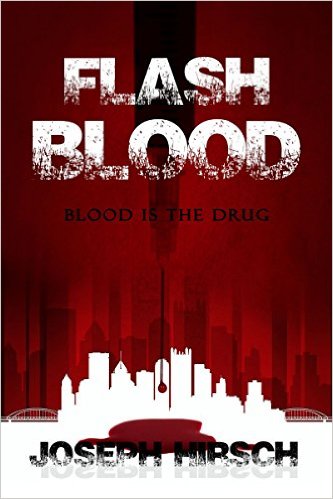From the Book Jacket…
Blood is the Drug. After twenty years as a private investigator, Detective James Arklow is seriously contemplating retirement—that is, until a man named Dan Maple shows up at his door holding one-hundred thousand dollars. He promises another hundred grand if Arklow agrees to find a missing drug addict and veteran of the war in Afghanistan. The detective agrees to take on the case, and gets much more than he bargained for when he stumbles onto a secret that might cost him his soul and his sanity.
TITLE: Flash Blood
AUTHOR: Joseph Hirsch
PUBLISHED: 1-Nov-14
PUBLISHER: Damnation Books, LLC
GENRE: Mystery-Thriller-Suspense
AMAZON: Flash Blood, Joseph Hirsh
WORKS: Joseph Hirsh Books
WEBSITE: Joseph Hirsh
4.5* MY INTRODUCTION TO Joseph Hirsch’s writing was with his novel Kentucky Bestiary. His attention to detail intrigued and impressed me. I am a fan of James Lee Burke for the same reason, although I do wish he’d stop preaching on the evil of alcoholism. Happily, Hirsch refrains from offering moral directives in Flash Blood, preferring to deliver entertaining plotlines and poetic prose that transport readers to settings as dark as Leavenworth Prison and as airy as a snow-capped mountain chalet in Nevada. Solid research, knowledge of the locations, and vivid settings complement the imaginative plot and character development.
Dan Maple meets Thaddeus Smith at a Veteran rehabilitation centre and grows to believe that Smith’s blood contains a natural hallucinatory, similar to heroin. When Smith disappears, Maple hires PI James Arklow to locate him. Enticed by the generous fee, the semi-retired PI and professor of criminology puts his writing aspirations on hold and accepts the case. A unique partnership develops when James Bender, a PI wannabe, offers Arklow his services in exchange for a short apprenticeship. Rather than state-of-the-art sleuthing technology, Arklow’s methods are somewhat noir, which creates a well-constructed relationship between the protagonist and sidekick.
Some readers may find the open ending inconclusive, but the denouement supports the ambiguous aspects of the plot. A small grumble is that the characters’ behaviour in the last scene contradicts what Hirsch shows throughout the novel. Cutting that final conflict wouldn’t hinder the story’s summation.
Flash Blood is an unorthodox mystery with a dash of traditional horror that I recommend to mystery-thriller buffs.
INTERVIEW WITH AUTHOR JOSEPH HIRSCH
|
Lori |
Thank you for taking the time to answer a few questions for readers. I’m excited that you agreed to be Perdition Games first featured author. You’re the author of eight books in a variety of genres, including western, fantasy, horror, science fiction, and thriller-suspense. Is there a genre you prefer to write? |
| Joseph | I have made a conscious effort as a writer to “hit all of the bases” in terms of genre; it’s a challenge I’ve set for myself. The only genre I haven’t tackled, which I intend to tackle, is high fantasy/sword and sorcery. My brother and I grew up on Dungeons and Dragons, and I’ve always felt drawn to the genre, but I’ve never turned my (meager) talents toward it. |
| Lori | Flash Blood is the second novel that features protagonist James Arklow. Has he hung up his detective hat or will readers see him again? |
| Joseph | Arklow is essentially me extrapolating twenty years into my own future. He’s essentially how I expect to see myself at the age of fifty or so. Arklow will probably make another appearance in the future, but I think it would be interesting to wait until I’m actually as old as my fictional creation before putting him through his paces again. |
| Lori | Readers often comment on your ability to create an atmosphere that generates the sensation of being there. What authors influence you when it comes to descriptive narrative? |
| Joseph | The main contemporary influences are probably Jed Ayres, Tom Kakonis, John Sheppard, James M. Brown, Jon Konrath, and Scott Phillips. The all-time great, in my opinion, in terms of setting the scene, is probably Charles Willeford. I think the critic Steven Erickson said something to the effect that Willeford’s style consisted of the careful accretion of detail adding up to incontrovertible truth of insight. The trick is to lull your readers into complacency, and to then spring some sort of trap that the reader didn’t expect or see coming. Lulling someone without boring them is a hard job, but Willeford (in his Hoke Mosley series of private eye novels) honed this fine skill down to a science. |
| Lori | Flash Blood has a scene set in Leavenworth Penitentiary. What’s your research process when you’re unable to visit your location? |
| Joseph | I am a research junky, so naturally, books are a big part of my research process. “Write what you know,” is sound advice, but, to paraphrase Charles Willeford speaking on the aforementioned quote, If we only wrote what we know, Philip K. Dick wouldn’t exist. Reading up on a subject is the most obvious answer to your question. When I wrote a request to Leavenworth Disciplinary Barracks asking for access to photos, etc., they very respectfully (but forcefully) declined. They did send me a manual for visitors, which I used as my starting point in describing the scene that takes place in Leavenworth. To any and all prisoners at the United States Disciplinary Barracks who read my novel and found the prison scene implausible, allow me to take this time to apologize. |
| Lori | You spent four years with the U.S. army stationed overseas in Iraq and Germany. Do you have plans to bring that experience into a new novel? |
| Joseph | The latest novel I’ve written, entitled Veterans’ Affairs, is a very personal account of my own PTSD, as a result of my experiences in Iraq. I’ve dealt with Iraq obliquely in many works, but I will eventually have to reopen that wound and address it head-on in a novel-length work. I’m trying to delay that day of reckoning for as long as possible, but that day will eventually come. |
| Lori | In addition to being an author, you’re a graduate student at university. Do you schedule time to write? |
| Joseph | Writing for me is a sort of addiction, so, like other addicts, the drug comes first, and I schedule everything else around that. I am mostly an autodidact, and I usually bridle at formal learning. The exception is a course taught by Tanja Nusser at the University of Cincinnati, who is a quite fascinating and knowledgeable lecturer. |
| Lori | When you start a new project, what is your process? Does the plot develop as you write, or do you work from a structured outline? |
| Joseph | I create a very bare-bones outline, and then, in the creative process, I tend to widely deviate from that. I tend to amass about 100,000 words or so of research material before sitting down to write, but only a small amount of that research makes its way into the novel. Some writers take a long time to create an iceberg, and then they show you the whole thing, and throw in maps and glossaries to boot (i.e. Tolkien, Frank Herbert). I like to create the whole iceberg for my own benefit, just to give the project verisimilitude, and then I show the reader the tip of the berg. |
| Lori | San Francisco Book Review gave Flash Blood 4 stars. Do you stress over editorial reviews and how important are reader reviews to you? |
| Joseph | Like almost everyone else, I care what people think of me, and my writing, and, like most people, I usually try to hide or deny that fact. My works have only been formally reviewed by major outlets twice (once by San Francisco Book Review, and once by Portland Book Review). In both instances, I emerged generally unscathed. I check Amazon and Goodreads slavishly for new reviews, and when I get a positive one, I’m walking on air for days. When I get a negative review, I feel like hanging myself; it’s a sickness. I also check library websites compulsively to see who has checked out my books. I think the best reaction an author can get is to receive some positive reviews, and some negative reviews. Nothing but negative reviews would be discouraging, and nothing but positive reviews would artificially inflate an author’s ego. In that respect, I’ve been very lucky; some people think I suck, and some people like what I do. Hell, I’m me and I have mixed feelings about my talent and my work. |
| Lori | Do you have any advice to offer aspiring authors? |
| Joseph | Try not to be so result-oriented immediately. Treat writing like exercising, as if it is its own reward. You might run twenty minutes every morning for your own health. If someone says you’re a great runner, that’s wonderful, but if someone says you’re a bad runner, or they’re indifferent to your running, you’ll still keep running, because it’s good exercise. I write to stay mentally health, and sane, and, as an accidental consequence, I’ve sold books and short stories and novellas. Everyone wants success, but learn to see writing as the end in itself, and success as a happy by-product or accident, rather than the goal. If you’re only going to be result-oriented in your writing, then it will be easy to give up, because in the first year (or several years) there will not be much outside encouragement. Really, advice is not the same thing as help, and if you really want to write, even if I told you not to write, you would ignore my advice and write. So, I guess that’s my advice to aspiring writers: Ignore me and write. |
| Lori | What is your favourite quote from Flash Blood? |
| Joseph | I like the quote where Detective Arklow is asked if he’s married, and he responds, “My life isn’t over, but certain aspects of it are.” I also think that when he injects the blood into his arm near the end of the book, the descriptive passage sings quite well. I’m not a great writer, but I can sometimes accidentally write something that exceeds my talents. To throw Willeford into the mix one more time, he put it best: “My work is one long triumph over my limitations. |







